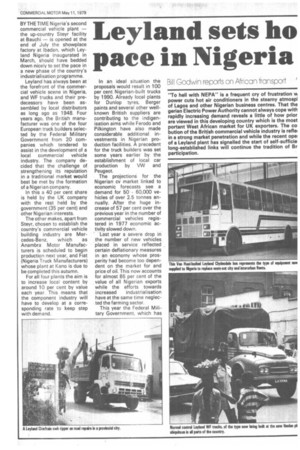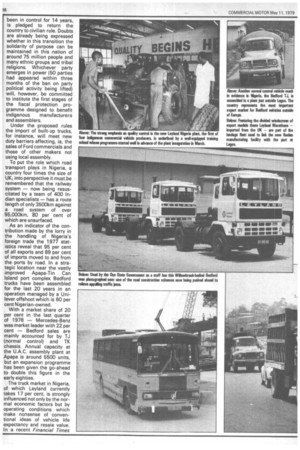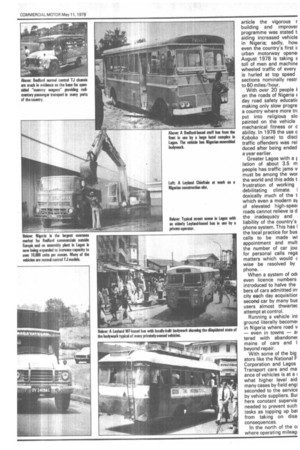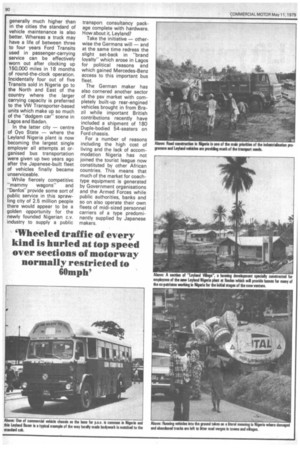Leyland sets ho pace in Nigeria
Page 89

Page 90

Page 91

Page 92

If you've noticed an error in this article please click here to report it so we can fix it.
Bill Godwin reports on African transport
BY THE TIME Nigeria's second commercial vehicle plant — the up-country Steyr facility at Bauchi — is opened at the end of July the showplace factory at lbadan, which Leyland Nigeria inaugurated in March, should have bedded down nicely to set the pace in a new phase of the country's industrialisation programme.
Leyland has always been at the forefront of the commercial vehicle scene in Nigeria, and WF trucks and their predecessors have been assembled by local distributors as long ago as 1948. Four years ago, the British manufacturer was one of the four European truck builders selected by the Federal Military Government from 20 companies which tendered to assist in the development of a local commercial vehicle industry. The company decided that the challenge of strengthening its reputation in a traditional market would best be met by the formation of a Nigerian company.
In this a 40 per cent share is held by the UK company with the rest held by the government (35 per cent) and other Nigerian interests.
The other makes, apart from Steyr, chosen to establish the country's commercial vehicle building industry are Mer cedes-Benz, which as Anambra Motor Manufacturers is scheduled to begin production next year, and Fiat (Nigeria Truck Manufacturers) whose plant at Kano is due to be completed this autumn.
For all four plants the aim is to increase local content by around 10 per cent by value each year. This means that the component industry will have to develop at a corresponding rate to keep step with demand. In an ideal situation the proposals would result in 100 per cent Nigerian-built trucks by 1990. Already local plants for Dunlop tyres, Berger paints and several other wellknown British suppliers are contributing to the indigenisation aims while Ferodo and Pilkington have also made considerable additional investments in Nigerian production facilities. A precedent for the truck builders was set some years earlier by the establishment of local car production by VW and Peugeot.
The projections for the Nigerian cv market linked to economic forecasts see a demand for 50 60,000 vehicles of over 2.5 tonnes annually. After the huge increase of 57 per cent over the previous year in the number of commercial vehicles registered in 1977 economic activity slowed down.
Last year a severe drop in the number of new vehicles placed in service reflected certain deflationary measures in an economy whose prosperity had become too dependent on the market for and price of oil. This now accounts for almost 85 per cent of the value of all Nigerian exports while the efforts towards increased industrialisation have at the same time neglected the farming sector.
This year the Federal Military Government, which has been in control for 14 years, is pledged to return the country to civilian rule. Doubts are already being expressed whether in this transition the solidarity of purpose can be maintained in this nation of around 75 million people and many ethnic groups and tribal religions. Whichever party emerges in power (50 parties had appeared within three months of the ban on party political activity being lifted) will, however, be committed to institute the first stages of the fiscal protection programme designed to benefit indigenous manufacturers and assemblers.
Under the proposed rules the import of built-up trucks, for instance, will meet new duty barriers affecting, ia, the sales of Ford commercials and those of other makers not using local assembly.
To put the role which road transport plays in Nigeria, a country four times the size of UK, into perspective it must,be remembered that the railway system — now being resuscitated by a team of 400 Indian specialists — has a route length of only 3500km against a road system of over 95,000km, 80 per cent of which are unsurfaced.
As an indicator of the contribution made by the lorry in the handling of Nigeria's foreign trade the 1977 statistics reveal that 95 per cent of all exports and 89 per cent of imports moved to and from the ports by road. In a strategic location near the vastly improved Apapa-Tin Can Island port complex Bedford trucks have been assembled for the last 20 years in an operation managed by a Unilever offshoot which is 60 per cent Nigerian-owned.
With a market share of 20 per cent in the last quarter of 1978 — Mercedes-Benz was market leader with 22 per cent — Bedford sales are mainly accounted for by TJ (normal control) and TK chassis. Annual capacity at the U.A.C. assembly plant at Apapa is around 5500 units, but an expansion programme has been given the go-ahead to double this figure in the early eighties.
The truck market in Nigeria, of which Leyland currently takes 17 per cent, is strongly influenced not only by the normal economic factors but by operating conditions which make nonsense of conventional ideas of vehicle life expectancy and resale value. In a recent Financial Times article the vigorous r building and improver programme was stated t aiding increased vehicle in Nigeria; sadly, hovu even the country's first ii urban motorway openei August 1978 is taking E. toll of men and machine wheeled traffic of every is hurled at top speed sections nominally restr to 60 miles/hour.
With over 20 people on the roads of Nigeria ( day road safety educatic making only slow progre a country where more tr.( put into religious slo painted on the vehicle mechanical fitness or c ability. In 1978 the use c Koboko (cane) to disci traffic offenders was rei duced after being ended a year earlier.
Greater Lagos with a lation of about 3.5 m people has traffic jams v must be among the wor the world and this adds t frustration of working debilitating climate. I doxically much of the t which even a modern sy of elevated high-speei roads cannot relieve is d the inadequacy and liability of the country's phone system. This has I the local practice for bus calls to be made wi appointment and mult the number of car jou for personal calls rega matters which would c wise be resolved by phone.
When a system of °di even licence numbers introduced to halve the bers of cars admittted in, city each day acquisitior second car by many bus users almost thwartec attempt at control.
Running a vehicle int ground literally become: in Nigeria where road v — even in towns — tered with abandonec mains of cars and I beyond repair.
With some of the big ators like the National F Corporation and Lagos Transport care and ma ance of vehicles is at a what higher level aid many cases by field engi seconded to the service by vehicle suppliers. Bui here constant supervis needed to prevent such tasks as topping up bat from taking on disa consequences.
In the north of the ci where operating mileag generally much higher than in the cities the standard of vehicle maintenance is also better. Whereas a truck may have a life of between three to four years Ford Transits used in passenger-carrying service can be effectively worn out after clocking up 150,000 miles in 18 months of round-the-clock operation. Incidentally four out of five Transits sold in Nigeria go to the North and East of the country where the larger carrying capacity is preferred to the VW Transporter-based units which make up so much of the "dodgem car" scene in Lagos and lbadan.
In the latter city — centre of Oyo State — where the Leyland Nigeria plant is now becoming the largest single employer all attempts at organised bus transportation were given up two years ago after the Japanese-built fleet of vehicles finally became unserviceable.
While fiercely competitive ”mammy wagons and "Danfos" provide some sort of public service in this sprawling city of 2.5 million people there would appear to be a golden opportunity for the newly founded Nigerian c.v. industry to supply a public transpont consultancy package complete with hardware. How about it, Leyland?
Take the initiative — otherwise the Germans will — and at the same time redress the slight set-back in "brand loyalty" which arose in Lagos for political reasons and which gained Mercedes-Benz access to this important bus fleet.
The German maker has also cornered another sector of the psv market with completely built-up rear-engined vehicles brought in from Brazil while important British contributions recently have included a shipment of 180 Duple-bodied 54-seaters on Ford chassis.
For a number of reasons including the high cost of living and the lack of accommodation Nigeria has not joined the tourist league now constituted by other African countries. This means that much of the market for coachtype equipment is generated by Government organisations and the Armed Forces while public authorities, banks and so on also operate their own fleets of midi-sized personnel carriers of a type predominantly supplied by Japanese makers.




















































































































































































































